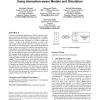Free Online Productivity Tools
i2Speak
i2Symbol
i2OCR
iTex2Img
iWeb2Print
iWeb2Shot
i2Type
iPdf2Split
iPdf2Merge
i2Bopomofo
i2Arabic
i2Style
i2Image
i2PDF
iLatex2Rtf
Sci2ools
139
click to vote
EDBT
2011
ACM
2011
ACM
Predicting completion times of batch query workloads using interaction-aware models and simulation
A question that database administrators (DBAs) routinely need to answer is how long a batch query workload will take to complete. This question arises, for example, while planning the execution of different report-generation workloads to fit within available time windows. To answer this question accurately, we need to take into account that the typical workload in a database system consists of mixes of concurrent queries. Interactions among different queries in these mixes need to be modeled, rather than the conventional approach of considering each query separately. This paper presents a new approach for estimating workload completion times that takes the significant impact of query interactions into account. This approach builds performance models using an experimentdriven technique, by sampling the space of possible query mixes and fitting statistical models to the observed performance at these samples. No prior assumptions are made about the internal workings of the database sy...
Related Content
| Added | 27 Aug 2011 |
| Updated | 27 Aug 2011 |
| Type | Journal |
| Year | 2011 |
| Where | EDBT |
| Authors | Mumtaz Ahmad, Songyun Duan, Ashraf Aboulnaga, Shivnath Babu |
Comments (0)

